I’ve read books in English, French, and Arabic. Both fiction and non-fiction.
Mostly, I’ll post here non-fiction English books. At least, the ones that I can recommend and might be relevant to most of you.
Also, I’ll skip the books that I read but don’t remember much of them. I spent a decade reading without taking notes. Please don’t do like me. It’s such a waste.
This section is only meant to spark your interest in books. So I’ll only write my impressions and three notes from the books. For more details, summaries and reviews, you can find them on Amazon or any other source.
For a faster research, you can click on any tag below to find the books of your interests.
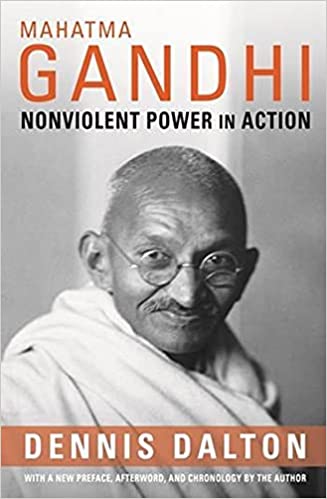
Mahatma Gandhi
Nonviolent Power in Action
Dennis Dalton
The book tackles Gandhi’s life from different perspectives making it a balanced analysis. It goes over Gandhi’s story before he became the Mahatma, how he evolved as a person, the origins of his unshakeable belief in nonviolence, inclusive leadership, the critiques of his contemporaries, the strengths and weaknesses of his method, his views on the Holocaust, and much more. Find out more in my 'Book Notes'.
Three notes from the book:
1- “The outward freedom therefore that we shall attain will only be in exact proportion to the inward freedom to which we may have grown at a given moment.”
2- “The belief that there is no connection between the means and the end is a great mistake. Through that mistake, even men who have been considered religious have committed grievous crimes. …there is just the same inviolable connection between the means and the end as there is between the seed and the tree. …We reap exactly as we sow.”
3- “Religion in the highest sense of the term. It includes Hinduism, Islam, Christianity, etc., but is superior to them all. You may recognize it by the name of Truth, not the honesty of experience, but the living Truth that pervades everything and will survive all destruction and all transformation.”
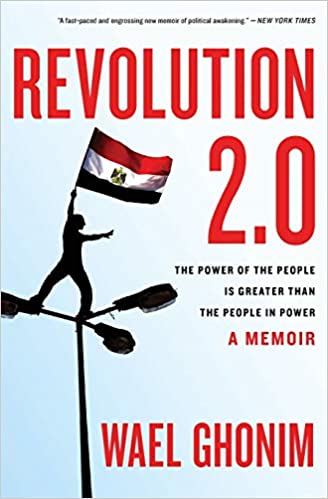
Revolution 2.0
The Power of the People Is Greater Than the People in Power: A Memoir
Wael Ghonim
I had no idea who Wael Ghonim was until I was researching for my article "(Almost) Everything You Need to Know About Media". I came across the work of Martin Gurri—author of The Revolt of the Public—who praised the book so much that I decided to buy it. I wasn't disappointed. Wael is definitely not an ordinary person. He moved from creating a Facebook page called "We Are All Khaled Said" to becoming one of the organizers of the Egyptian revolution. Moving people from the virtual to the real world and breaking the fear barrier was a great feat. And this book tells the story.
Three notes from the book:
1- The more you can get everyone involved in trying to solve your problems, the more successful you will be. I found it natural, a few years later, to apply this philosophy to political and social activism.
2- The strategy for the Facebook page ultimately was to mobilize public support for the cause. This wasn't going to be different from the "sales funnel" approach I learned at school. The first phase was to convince people to join the page and read its posts. The second was to convince them to start interacting with the content by "liking" and "commenting" on it. The third was to get them to participate in the page's online campaigns and to contribute to its content themselves. The fourth and final phase would occur when people decided to take activism to the street. This was my ultimate aspiration.
3- The rapid pace of events drove home one of the key strategies I learned from the revolution: to achieve your vision, you need friends and communication channels more than you need plans. The world moves too fast for even the best-laid plans to hold up.
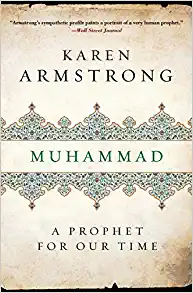
Muhammad
A Prophet for Our Time
Karen Armstrong
It is one thing that, we Muslims, are praising the Prophet Muhammad (pbuh). It is another thing that an "outsider" to Islam praises him. Karen Armstrong is a renowned commentator on religious history. Even if she has some distance from what we consider the miracles of the life of the Prophet, she painted a fascinating and fair portrait of Muhammad (pbuh). This book is particularly important when we know that Western critics persist in viewing the Prophet of Islam as a monster!
Three notes from the book:
1- The Quranic institution of polygamy was a piece of social legislation. It was designed not to gratify the male sexual appetite, but to correct the injustices done to widows, orphans, and other female dependants, who were especially vulnerable.
2- Some of the Jews were also becoming hostile to the newcomers. Muhammad did not expect them to convert to Islam, and their quarrel with him was not primarily religious but political and economic. The Jews' position in the oasis had deteriorated, and if Muhammad succeeded in uniting Aws and Khazraj, they would have no chance of regaining their former supremacy.
3- The primary meaning of that word [jihad], which we hear so often today, is not "holy war" but the "effort" or "struggle" necessary to put the will of God into practice. Muslims are exhorted to strive in this endeavor on all fronts: intellectual, social, economic, spiritual, and domestic. Sometimes they would have to fight, but this was not their chief duty.
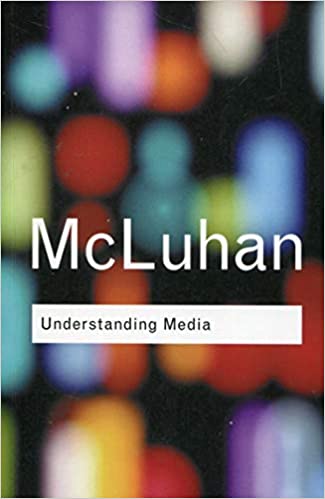
Understanding Media
The Extensions of Man
Marshall McLuhan
I must warn you that McLuhan has his own writing style. Some parts are difficult to read. If you want a quick intro to this book, you can read the first part of my article "(Almost) Everything You Need to Know About Media". McLuhan is famous for expressions like "global village" or "the medium is the message". He analyzed our media from the beginning of time. When you consider such a large historical period, you can derive important insights into how much our media transformed us.
Three notes from the book:
1- Once we have surrendered our senses and nervous systems to the private manipulation of those who would try to benefit from taking a lease on our eyes and ears and nerves, we don't really have any rights left.
2- Language does for intelligence what the wheel does for the feet and the body. It enables them to move from thing to thing with greater ease and speed and ever less involvement.
3- The effects of technology do not occur at the level of opinions or concepts, but alter sense ratios or patterns of perception steadily and without any resistance.
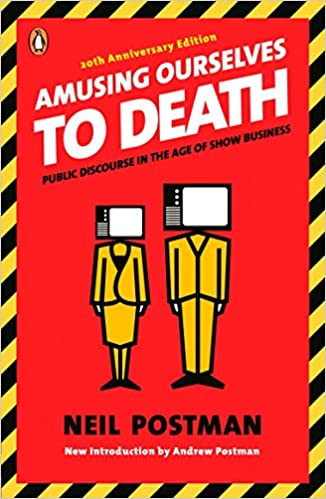
Amusing Ourselves to Death
Public Discourse in the Age of Show Business
Neil Postman
This book inspired my article "How Does the Media Change Our Culture, Worldview, and Brain?". Even if it was written in the eighties, it's still relevant today. Neil Postman reveals the embedded biases in our technologies and how they affect our culture. You'll understand why entertainment has such a big place in our societies.
Three notes from the book:
1- Orwell feared that the truth would be concealed from us. Huxley feared the truth would be drowned in a sea of irrelevance. Orwell feared we would become a captive culture. Huxley feared we would become a trivial culture… In 1984, people are controlled by inflicting pain. In Brave New World, they are controlled by inflicting pleasure. In short, Orwell feared that what we hate will ruin us. Huxley feared that we love will ruin us.
2- A major new media changes the structure of the discourse; it does so by encouraging certain uses of the intellect, by favoring certain definitions of intelligence and wisdom, and by demanding a certain kind of content–in a phrase, by creating new forms of truth-telling.
3- People will come to adore the technologies that undo their capacities to think.
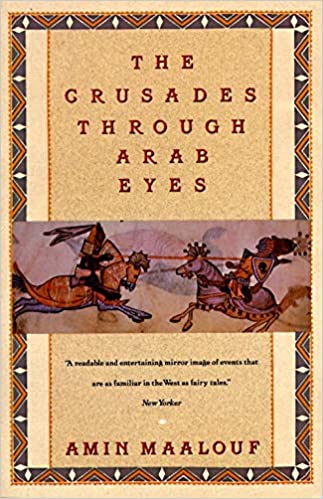
The Crusades Through Arab Eyes
The Other Side of The Story
Amin Maalouf
As I was writing this note, I realized that Amin Maalouf is one of the authors I read the most. I enjoyed reading 'Leo Africanus', 'The Rock of Tanios' or 'Samarkand'. The dry style of many history books makes them difficult to read. This one is written like a novel and you'll have a hard time putting it down.
Three notes from the book:
1- Regard the Franj! Behold with what obstinacy they fight for their religion, while we, the Muslims, show no enthusiasm for waging holy war. Saladin
2- When some of his collaborators chided him for his profligacy, Saladin answered with a nonchalant smile: There are people for whom money is no more important than sand.’
3- As for territory, this land has always been ours, and your occupation is only transitory. You were able to settle in it because of the weakness of the Muslims who then peopled it, but so long as there is war, we will not allow you to enjoy your possessions.
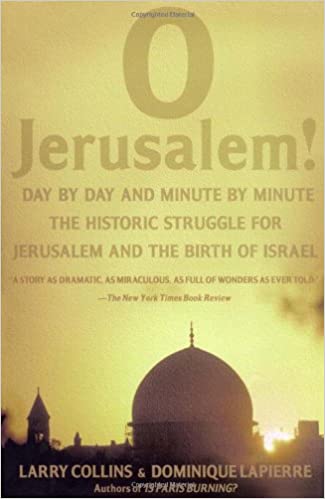
O Jerusalem!
The Historic Struggle for Jerusalem and the Birth of Israel
Larry Collins & Dominique Lapierre
I read this book when I was in high school and I still remember some parts of it (which is rare in my case). This book is written in a way that you feel like witnessing the events. It moves at a fast pace from the Arab to the Jewish side describing their strategies, strengths, and weaknesses. Building a state out of nothing is not an easy task, especially when your neighbors don't want you there. After reading this book, you'll have a better understanding of why the Palestinians are in such a terrible situation.
Three notes from the book:
1- For the Arabs, and the above all for the 1.2 million Arabs of Palestine, the partitioning of the land in which they had been a majority for seven centuries seemed a monstrous injustice thrust upon them by white Western imperialism in expiation of a crime they had not committed.
2- In Jerusalem, as elsewhere in Palestine, the Haganah's basic strategy reflected a philosophy propounded by David Ben-Gurion. What the Jews had, they must hold. No Jew was to leave his home, his farm, his kibbutz, his office without permission. Every outpost, every settlement, every village, no matter how isolated, was to be clung to as though it were Tel Aviv itself.
3- Heirs to the philosophy of a Zionist zealot named Vladimir Jabotinsky, they clung to the dream of a Jewish state running from Acre to Amman, from Mount Hermon to the Suez Canal. For them, Churchill's decision to create the Emirate of Transjordan with a stroke of his pen on a Sunday afternoon in Cairo had been a mutilation of the Balfour Declaration. They wanted it all, all the land that had once belonged to the Biblical kingdom of Israel, and they wanted it, if possible, without the encumbering presence of its Arab inhabitants.







